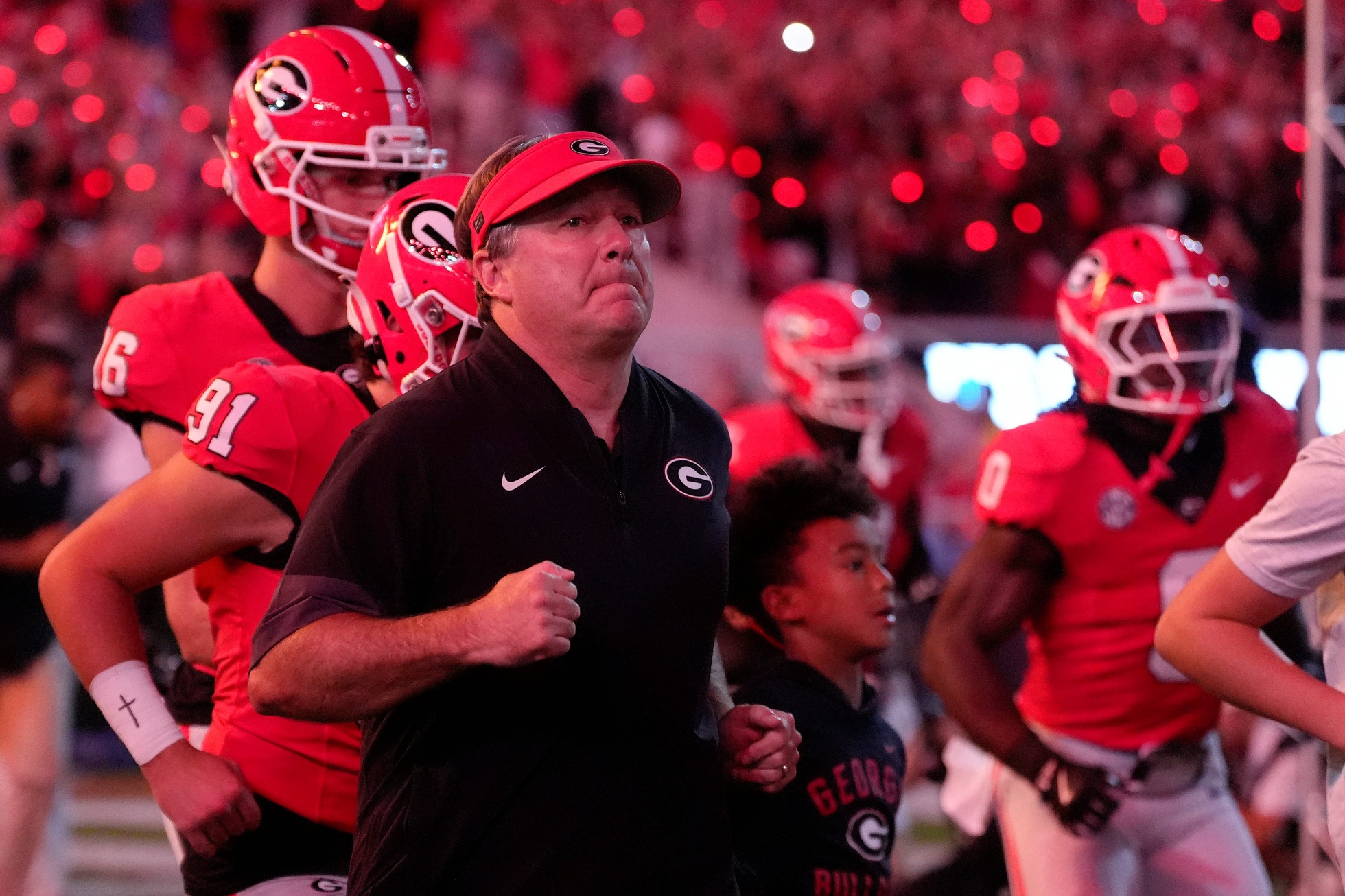Kirby Smart is not calling timeout on College Football Playoff expansion. We've only had one year of the 12-team playoff field, but the Georgia Bulldogs head coach says we should make it even bigger. Appearing on "The Pat McAfee Show" this week ahead of a huge matchup in Athens against the Ole Miss Rebels, Smart made the case for allowing more programs and fans to enjoy playoff appearances. When asked whether ratings would continue to grow if the field were expanded, Smart responded by saying he thinks they'd keep growing. "Would they not be if it was 16, or 24, or 30 teams? I think they still would be. I think the ratings would still be higher," Smart said. "I think you’d have unbelievable playoffs. It’s going to mimic the NFL when we get to having that many teams potentially in the playoffs, so you get better matchups for longer. Because these games at the end of the year are going to come down to essentially being play-in games. You’re either in or you’re out. "I would love to see a bigger pool of teams make the playoff, because that’s what all our fanbases want is an opportunity to do that," he added. Kirby Smart Wants More Games Between Big Ten-SEC He wasn't done with the hot takes. Smart also had some thoughts on how to settle the ongoing debate of conference superiority between the Big Ten and SEC. Play more games between the two conferences. "We’re not going to know until they start putting us all in there and they play cross-conference, like they do in basketball, I’d love to do one of those with another conference," he said. "That’s one of Lane (Kiffin’s) biggest complaints, and Lane is very bright, and Lane’s biggest concern is we’re losing opportunities to play other conferences when we schedule nine conference games. … There’s less opportunities for us to play other conferences. And the only way to measure conference-to-conference (are head-to-head matchups)." He also pointed out that the only way to settle the issue of SEC teams being consistently over-ranked is to have more non-conference games. "I think the greatest debate right now in college football is … other conferences saying, ‘Ah, well, the SEC just has all these teams ranked, but they don’t deserve to be ranked and they play each other and beat each other up.’ But I don’t think we’ll ever know the truth," he continued. "I always say: go poll the NFL scouts and get them to tell you where they’re pulling from and where they’re drafting from, and that usually equals the best teams. Who has the most players drafted? (Georgia) did when we won the national championship. Michigan did when they won the national championship. Ohio State did when they won the national championship. Just look at that and that’ll tell you where the best players and teams are." There's a lot going on here, but Smart makes some good points, and some very bad ones. An expanded playoff would further dilute the importance of the regular season in college football, and while ratings would certainly remain high, is it worth it? Most fans would say no. It's generally a positive that one loss, or now two, doesn't end your season anymore. But do we really need four loss teams making a 30-team playoff? If the goal is to identify the best team, the more randomness and variance inserted into the playoff field, the less likely that is to happen. As far as the SEC-Big Ten debate goes, more head-to-head matchups might not settle arguments, but it would make for a ton of fun games. Measuring conference success by NFL draft picks, however, is virtually meaningless. One of the best players in the NFL is Josh Allen, who went to Wyoming. Does that mean the Mountain West was one of the best conferences? Of course not. Having NFL talent is obviously beneficial, but how the NFL evaluates individual players is wildly different from measuring college football production. The top-10 in the 2025 draft included players from Miami, Colorado, Boise State, Missouri, and Arizona. It's not meaningless, but having 4–5 players on an entire roster drafted doesn't automatically mean a specific team is better than another. Who knows whether Smart's proposed changes will ever happen. But with the influence coaches at his level have, it's not as far-fetched as it sounds.
Kirby Smart Wants An Even Bigger College Football Playoff, Talks Big Ten-SEC Rivalry
Kirby Smart is not calling timeout on College Football Playoff expansion. We've only had one year of the 12-team playoff field, but the Georgia Bulldogs head coach says we should make it even bigger. Appearing on "The Pat McAfee Show" this week ahead of a huge matchup in Athens against the Ole Miss Rebels, Smart made the case for allowing more programs and fans to enjoy playoff appearances. When asked whether ratings would continue to grow if the field were expanded, Smart responded by saying he thinks they'd keep growing. "Would they not be if it was 16, or 24, or 30 teams? I think they still would be. I think the ratings would still be higher," Smart said. "I think you’d have unbelievable playoffs. It’s going to mimic the NFL when we get to having that many teams potentially in the playoffs, so you get better matchups for longer. Because these games at the end of the year are going to come down to essentially being play-in games. You’re either in or you’re out. "I would love to see a bigger pool of teams make the playoff, because that’s what all our fanbases want is an opportunity to do that," he added. Kirby Smart Wants More Games Between Big Ten-SEC He wasn't done with the hot takes. Smart also had some thoughts on how to settle the ongoing debate of conference superiority between the Big Ten and SEC. Play more games between the two conferences. "We’re not going to know until they start putting us all in there and they play cross-conference, like they do in basketball, I’d love to do one of those with another conference," he said. "That’s one of Lane (Kiffin’s) biggest complaints, and Lane is very bright, and Lane’s biggest concern is we’re losing opportunities to play other conferences when we schedule nine conference games. … There’s less opportunities for us to play other conferences. And the only way to measure conference-to-conference (are head-to-head matchups)." He also pointed out that the only way to settle the issue of SEC teams being consistently over-ranked is to have more non-conference games. "I think the greatest debate right now in college football is … other conferences saying, ‘Ah, well, the SEC just has all these teams ranked, but they don’t deserve to be ranked and they play each other and beat each other up.’ But I don’t think we’ll ever know the truth," he continued. "I always say: go poll the NFL scouts and get them to tell you where they’re pulling from and where they’re drafting from, and that usually equals the best teams. Who has the most players drafted? (Georgia) did when we won the national championship. Michigan did when they won the national championship. Ohio State did when they won the national championship. Just look at that and that’ll tell you where the best players and teams are." There's a lot going on here, but Smart makes some good points, and some very bad ones. An expanded playoff would further dilute the importance of the regular season in college football, and while ratings would certainly remain high, is it worth it? Most fans would say no. It's generally a positive that one loss, or now two, doesn't end your season anymore. But do we really need four loss teams making a 30-team playoff? If the goal is to identify the best team, the more randomness and variance inserted into the playoff field, the less likely that is to happen. As far as the SEC-Big Ten debate goes, more head-to-head matchups might not settle arguments, but it would make for a ton of fun games. Measuring conference success by NFL draft picks, however, is virtually meaningless. One of the best players in the NFL is Josh Allen, who went to Wyoming. Does that mean the Mountain West was one of the best conferences? Of course not. Having NFL talent is obviously beneficial, but how the NFL evaluates individual players is wildly different from measuring college football production. The top-10 in the 2025 draft included players from Miami, Colorado, Boise State, Missouri, and Arizona. It's not meaningless, but having 4–5 players on an entire roster drafted doesn't automatically mean a specific team is better than another. Who knows whether Smart's proposed changes will ever happen. But with the influence coaches at his level have, it's not as far-fetched as it sounds.




